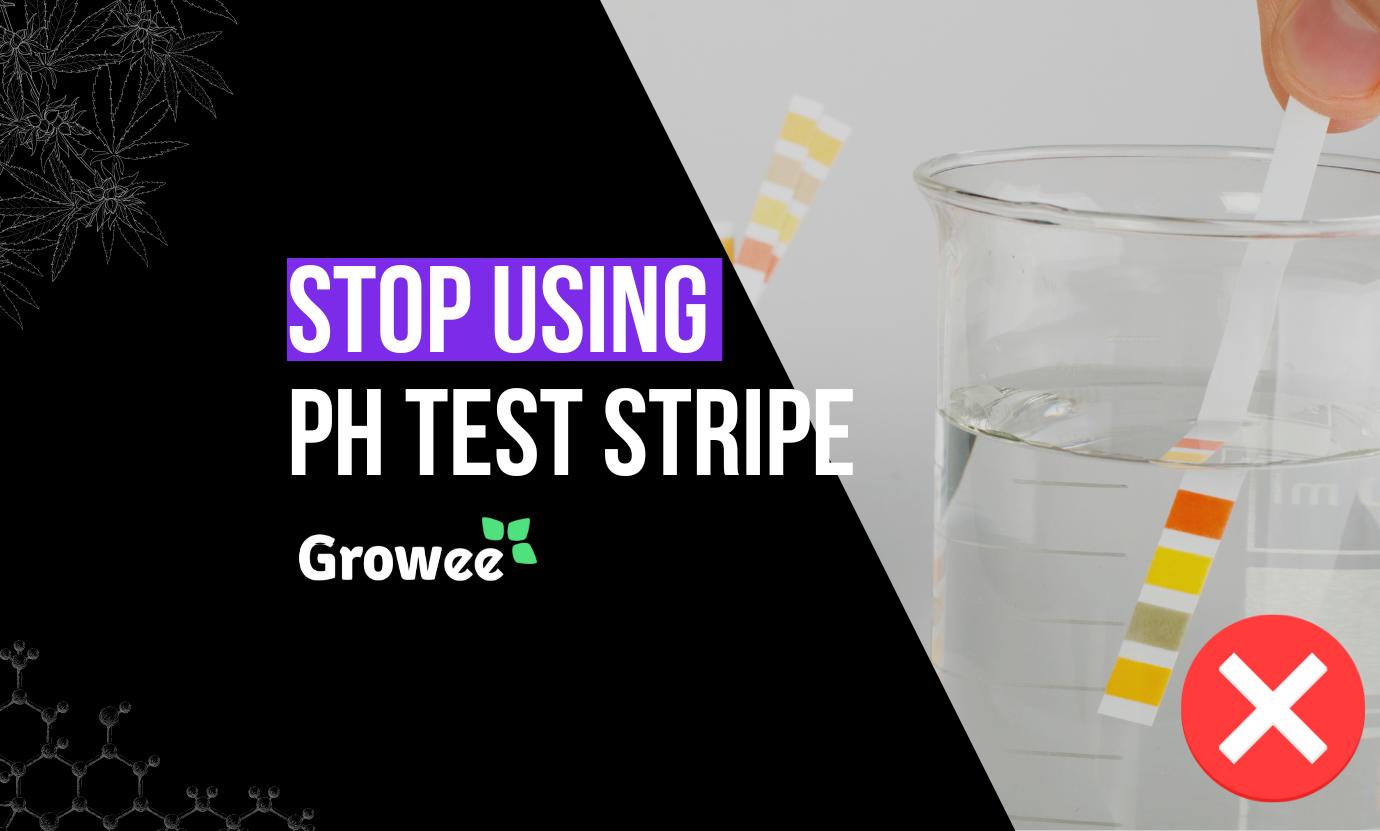When growing hydroponic plants and crops, one of the most important considerations to keep in mind is the water pH level. Wrong pH levels can have dire impacts on your hydroponic system.
So, why is pH so important? It’s one of the many questions we are here to answer today. However, our main goal today is to talk about the various methods that you can use to test the pH in your hydroponics system, with our main focus being on pH testing strips.
pH testing strips are known as being a fast and easy way to test for potential hydrogen, but they also have a variety of drawbacks, especially for hydroponics. Why you should stop using pH strips for hydroponics is exactly what you’ll learn today.
What is pH in Hydroponics?
In its most basic form, pH or “potential hydrogen” is a measure of how many hydrogen ions are found in a specific solution. This indicates how acidic or alkaline it is. The pH scale ranges between 0 and 14, with 7 being completely neutral, anything under 7 being acidic, and everything over 7 being alkaline or basic.
Knowing your pH levels is important because the health and feeding of your plants depend on it. If the pH is too high, the plants can’t absorb nutrients; if it’s too low, the roots can get damaged. For more information, check out this article: How to Keep pH Stable in Hydroponics.
Controlling the pH in a hydroponics system is much more important to do accurately than with soil since soil usually acts as a natural buffer.
Overall, the pH of your nutrient solution is important to know because it determines how available various nutrients will be to your plants. The pH also determines how healthier plants are, how fast they grow, and how much of a yield they produce.
What is an Ideal pH Range for Hydroponics?
In hydroponics, most plants require a pH of between 5.5 and 6.5. To be clear, this means that most hydroponic plants prefer their nutrient solutions to be slightly acidic.
Why is pH Important in Hydroponics?
There are a few reasons why the pH in your hydroponics setup is so important.
The Availability of Nutrients
To elaborate, pH is important in hydroponics mainly due to nutrient uptake. How available the various nutrients in your watering solution are to your plants is determined by the pH level. For instance, if the pH is far too low or acidic, there are nutrients like calcium, phosphorus, and magnesium, that become less available to your plants.
On the other hand, if the watering solution is too alkaline, which means that the pH is too high, nutrients like zinc, manganese, and iron are less available to your plants. In either direction, an extreme pH level can cause nutrients to precipitate directly out of your watering solution, which can lead to severe nutrient deficiencies in your plants.
Plant Enzymes, Root Health, and Microbes
That’s not all, because the pH of the solution also affects how active enzymes in plant cells can be, which influences metabolic processes. If you expect your plants to maintain efficient metabolisms, an ideal pH range is required.
Overall, the ideal pH range for various hydroponic plants is needed to maintain great root health. Your nutrient solution should also contain a variety of beneficial microbes.
By balancing the pH level in your nutrient solution, you can also balance the growth of harmful and beneficial microbes. In absence of the appropriate pH level, harmful microbes might multiply and negatively affect the health of your plants.
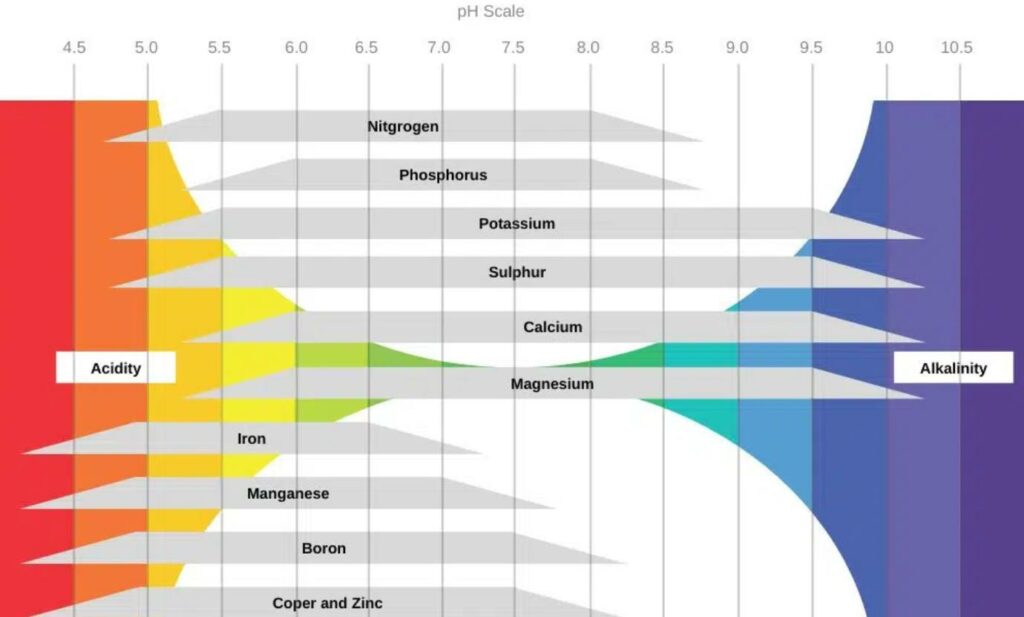
See How Growee Can Save You Time By Automating Your Plants Feeding
Water pH – Automated pH Up and Down Control
Nutrients Mixing – Automated Nutrient Dosing with Target EC / PPM Control.
Control From Anywhere – WiFi Connection and mobile App
The Three Main Methods for Monitoring Water pH in Hydroponics
There are three main methods for monitoring water pH in hydroponics, and these include pH testing strips, a digital pH pen, and a pH controller. Let’s take a quick look at each of these.
Using pH Testing Stripsand balance manually
One of the most common methods of monitoring water pH in hydroponics is by using pH testing strips. These are very small and thin papers that are treated with a special chemical that causes them to change color when they are dipped into any kind of liquid solution.
This should tell you what the pH level of your nutrient solution is. Every strip should have a variety of colored squares or a small zone that reacts with the hydrogen in water.
Exactly which color the strip changes to tells you what the pH level is, which you can compare to the color chart provided with the strips. Every color coincides with a different pH value. As you will see further below however, there are some pretty big negative aspects to using pH testing strips. With that said, they’re fine for occasional use and for small setups.
Using a Digital pH Pen and balance manually
The next option at your disposal is a digital pH pen. This is also known as a pH meter. It’s a simple yet effective electronic device that is designed to measure the pH level of the solution. It uses sensitive glass bulbs contained inside of a probe.
That probe creates a small amount of voltage that can vary depending on the hydrogen ion concentration in your watering solution. That voltage is then automatically converted into a reading on a digital screen.
Many people prefer these as they are very easy to use. You just have to dip them in the solution, and they will then provide you with a reading. There’s also the fact that they tend to be quite accurate, usually to within 0.01 pH, which is quite impressive. pH meters and pens are also designed to be quite durable.
The downside with them however is that they require constant calibration using a specific pH calibration solution, and this can be quite difficult for beginners to do. There’s also the fact that digital pH pens can be quite costly, not to mention that they require constant battery replacements.
Using a pH Controller
We then have the pH controller, which is perhaps the most advanced way to monitor pH in a nutrient solution for your hydroponics system. This is an electronic device that uses special probes to measure the hydrogen ion concentration in a solution, which it then displays on a screen in a simple reading.
However, a good pH controller does so much more than that, because they should also be able to automatically adjust the pH of the nutrient solution. These are systems that come complete with pH probes, a controller unit, and dosing pumps.
Those dosing pumps are hooked up to small reservoirs with pH up and pH down solutions, so the system can automatically make adjustments as needed. You can set the pH to a specific value, and when the controller senses that the pH is outside of the acceptable range, it will automatically make adjustments.
In terms of advantages, the fact that this is all automated is a big deal, because it takes a lot of the hard work out of the equation. pH controllers also tend to be very reliable, precise, and consistent, allowing for the best possible results. While pH controllers might be a bit expensive, they are also by far the best option.
How Do pH Strips Work?
As mentioned above, pH strips work through a special chemical solution which is designed to change colors when exposed to hydrogen ions. Depending on the color that the strip changes to, it indicates a specific pH level. As you can probably tell, there are some pros and cons of using pH strips.
Pros of Using pH Strips
- The biggest benefit of using pH strips is that they are very affordable. They are by far the cheapest method of testing for pH in a hydroponic solution.
- Another pro of using pH strips is that the results are immediate. pH testing strips change color as soon as you dip them into the nutrient solution, so you can get to making adjustments faster.
Cons of Using pH Strips
- Single use – one of the biggest downsides of using pH strips is that they are single-use. Each strip can only be used a single time and can never be reused. If you’re just doing occasional pH testing, this might not be a big deal. However, if you have a hydroponic system that requires regular checks, then this method is not efficient. Those costs can add up over time.
- Accuracy – a major drawback with pH testing strips to consider is that they generally aren’t all that accurate. For the most part, you can expect them to be accurate within 0.5 to 1 pH unit, which as you can tell, is not very accurate. With such a big error margin, the pH in your hydroponic solution might be 7.5, but the strips display a 6.5, indicating that the PH solution is ideal, when in fact it is far from.
How to Choose the Right pH Testing Method?
There are several factors to consider when choosing the right pH testing method for your needs.
Size of the Operation
First, consider the size of your hydroponic operation. If you’re just a small-scale grower with a couple of plants, PH testing strips or a pH meter might be fine. However, as soon as you start having more than a few plants, and your nutrient reservoir is of a decent size, then those pH testing strips start becoming very inefficient and time consuming. Something like a pH controller is much better for medium and larger operations, as it can save you a lot of time and effort.
Testing Frequency
You then also want to consider the frequency at which you need to test your hydroponics solution. Generally speaking, hydroponic solutions should be tested for pH on a very regular basis, at least a few times per week.
Although pH testing strips might work fine to provide you with immediate results, they start becoming very tedious when you have to constantly use them day after day.
It’s much easier if you have something like a pH pen or pH controller that automatically provides you with readings on a regular basis. A pH controller provides you with consistent and constant readings that you can just view on a screen.
Your Budget
If you are operating on a tight budget, it might seem to make sense to use pH testing strips because they’re not very expensive. However, over the long run, the cost of these strips can add up, especially if you need a lot of them. Although something like a pH controller might be relatively expensive to purchase up front, in the long run, it can end up saving you a whole lot of money.
Accuracy of the Method
One of the biggest considerations to keep in mind here is accuracy. As mentioned above, pH testing strips just aren’t that accurate and have a large margin of error. However, something like a pH controller has a much smaller margin of error and is generally accurate to within 0.01. In terms of maintaining optimal root health and nutrient uptake, reading accuracy can make a big difference.
Ease of Use
The final consideration here is either of use. The simple fact is that a pH controller just needs to be installed once, set up, and it’s ready to go. You never have to do anything else ever again besides monitor the readings and occasionally fill up the reservoirs. While pH strips may be easy to use in theory, if you’re not standing in good lighting or are good at telling colors apart, they can actually be rather difficult to use.
Why Should You Move from a Digital pH Pen to the Growee pH Controller?
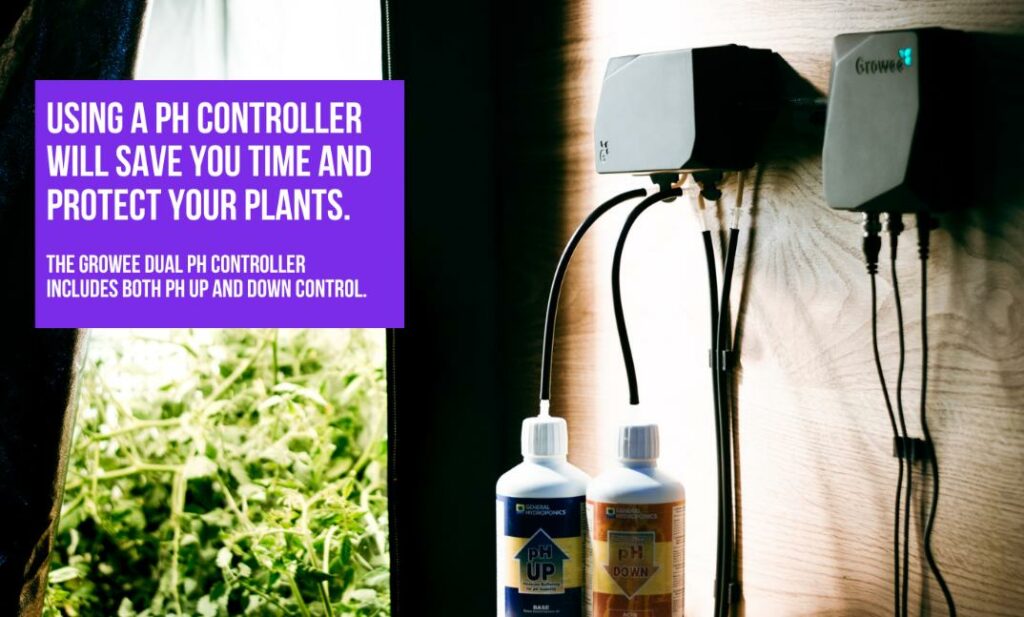
When compared to a digital pH pen, there are several reasons why you might want to consider a Growee pH controller.
Top 4 Benefits Of Using The Growee pH Controller:
- Save Time with Automatic Adjustment:
Of course, the biggest benefit of the Growee pH controller is that it automatically adjusts the pH level for you. Unlike a regular pH pen, which only monitors pH levels, the Growee controller can dispense pH up and pH down solutions to maintain the optimal pH balance for your crop, saving you significant time.
- Easy to Use, No More Manual Labor:
Using a pH pen requires manual testing, where you have to stick the pen into the solution each time you want to check the pH. In contrast, the Growee pH Controller continuously monitors and adjusts the pH levels without any manual intervention, making it easy to use and eliminating the need for manual labor.
- Control from Anywhere with the Growee App:
One of the best and most liked features of the Growee pH Controller is its connectivity, Wifi / Ethernet, you can monitor and control your hydroponic system from anywhere using the Growee hydroponics app, giving you unparalleled convenience and peace of mind
- Smart Algorithm for Dual pH Control:
The Growee pH Controller features a smart algorithm for dual pH control, automatically adjusting pH levels up and down. This protects the plants’ roots from major pH fluctuations, ensuring a stable and healthy growing environment.
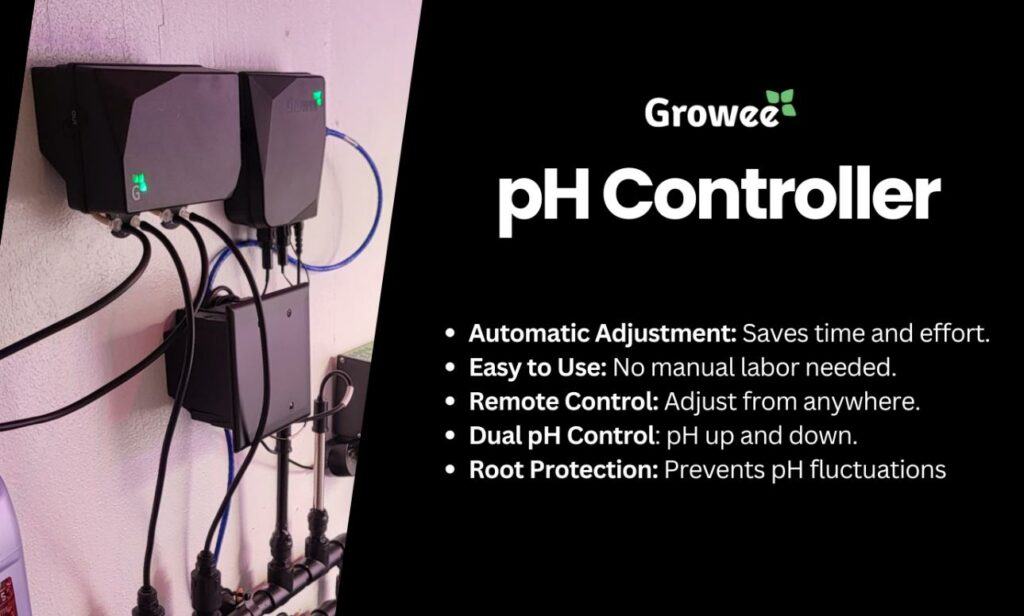
Conclusion
In summary, pH testing strips and digital pH pens have limitations that make them less effective for hydroponic systems. They might provide instant results, but their accuracy and convenience fall short. Test strips are more popular in middle school science classes than in hydroponic grow setups. If you seek an accurate, efficient, and hassle-free way to monitor and automatically adjust your pH levels, the Growee pH Controller is highly recommended.
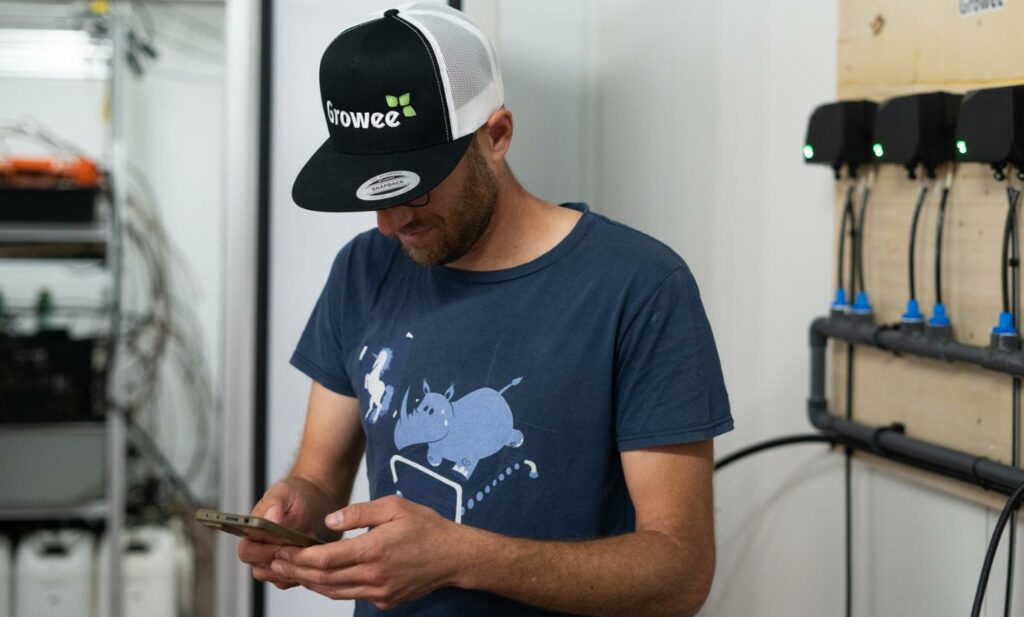
FAQ
How accurate are pH testing strips?
pH testing strips are usually only accurate to within 1 pH unit, which is a very large margin of error. Other methods, such as pH controllers, are much more accurate.
How do pH testing strips compare to automated pH testers in terms of accuracy?
Both pH pens and pH controllers are usually accurate to within 0.01 of a pH unit, which is therefore exponentially more accurate than a regular pH testing strip.
Can I use pH testing strips in large-scale hydroponic systems?
While you can technically use pH testing strips for a large scale system, it really doesn’t make sense. They’re not accurate enough to keep track of pH levels for such large needs.
What are the main differences between pH testing strips and Growee pH automation?
Whereas pH testing strips require you to test manually every time, Growee pH automation does all of the work for you. The probe sits in your nutrient solution and provides you with constant updates, without you having to do anything at all. Moreover, Growee automation equipment it’s just much more accurate than any pH testing strip could ever be. The bottom line is that Growee automaton equipment makes life a lot more easy and reliable as far as pH testing is concerned.

